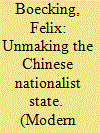| Srl | Item |
| 1 |
ID:
130617


|
|
|
| 2 |
ID:
085590


|
|
|
|
|
| Publication |
2008.
|
| Summary/Abstract |
Mao's confidence in military confrontations with more powerful adversaries continues to inspire Chinese strategists more than half a century later. This article explores the origins and development of Mao's thinking in this regard, focusing particularly on his years in Yan'an. Drawing on newly available sources, the analysis stresses the importance of experience, as opposed to ideology, in the development of Mao's martial confidence. For much of his time in Yan'an Mao was relatively circumspect in his military ambitions. Yet towards the end of this period his confidence rose considerably after successes against the KMT offensive in 1946. In short, Mao's martial confidence did not spring fully formed from his ideological convictions but emerged over time.
|
|
|
|
|
|
|
|
|
|
|
|
|
|
|
|
| 3 |
ID:
103312


|
|
|
|
|
| Publication |
2011.
|
| Summary/Abstract |
The defeat of the Chinese Nationalist Party (Guomindang) in the Chinese Civil War in 1949 is often explained as a consequence of Nationalist fiscal incompetence during the Second Sino-Japanese War, which led to the collapse of the Nationalist state. In this paper, I argue that from 1937 until 1940, GMD fiscal policy managed to preserve a degree of relative stability even though, by early 1939, the Nationalists had already lost control over ports yielding 80 per cent of Customs revenue which, during the Nanjing decade (1928-1937), had accounted for more than 40 per cent of annual central government revenue. The loss of this revenue forced the Nationalists to introduce wartime fiscal instruments, taxation in kind, and transit taxes, both previously condemned as outdated and inequitable by the Nationalists. Further territorial losses led to the introduction of deficit financing, which in turn became a cause of hyperinflation. The introduction of war-time fiscal instruments led to administrative changes in the revenue-collecting agencies of the Nationalist state, and to the demise of the Maritime Customs Service as the pre-eminent revenue-collecting and anti-smuggling organization. The administrative upheavals of the war facilitated the rise of other central government organizations nominally charged with smuggling suppression, which in fact frequently engaged in trade with the Japanese-occupied areas of China. Hence, administrative reforms at a time of fiscal collapse, far from strengthening the war-time state, created one of the preconditions for the disintegration of the Nationalist state, which facilitated the Chinese Communist Party (CCP) victory in 1949.
|
|
|
|
|
|
|
|
|
|
|
|
|
|
|
|